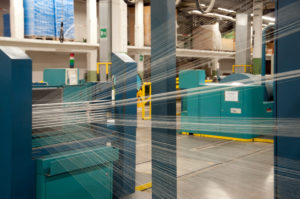 The application of the Quality Control Guidebook is essential so that the spinning textile products possess all quality requirements able to meet the market demand. The proposed model refers to cotton spinning and is also valid, with appropriate corrections, for all other types of textile fibers spinning
The application of the Quality Control Guidebook is essential so that the spinning textile products possess all quality requirements able to meet the market demand. The proposed model refers to cotton spinning and is also valid, with appropriate corrections, for all other types of textile fibers spinning
Today, a modern textile fibers spinner requires a valid and efficient quality control of raw materials, semi-finished and finished products.
The function of the Quality Control is to maintain a constant and scheduled control of all technical operations related to the production, by logically gathering together the surveyed values and comparing them with quality standards; in this way it can cooperate with the Spinning Direction and provide qualified assistance to the technical Department.
In this view, within each company, the formulation of a Control Guidebook is to be considered as an essential tool for Quality Assurance in all textile fiber spinners.
The Quality Control Guidebook herein proposed, applicable in combed cotton spinning, consists of:
1) Plan of lab tests, with time and work schedule.
2) Control Methods.
3) Calculation formulas.
4) Handouts for results’ registration.
5) Comparison with qualitative standards.
Plan of lab tests (table 1)
Department |
Control type |
Control frequency |
Sample size |
Card |
Title and CV%Uster%Neps |
WeeklyWeeklyWeekly |
5 samples by 7 yds/card1 test/card1 test/card |
Drawing frame1° pass. |
Title and CV%Uster% |
DailyDaily |
5 samples by 7 yds/capita1 test/capita |
Winder |
rpm canvas |
Weekly |
1 test by 1m/canvas for 5 canvas |
Combing machine |
Title and CV%DeviationUster%Neps |
WeeklyWeeklyWeeklyWeekly |
5 samples by 7 yds/card1 test for combing machine1 test for combing machine1 test for combing machine |
Drawing frame2° pass. |
Title and CV%Uster % |
2 times/rDaily |
5 samples by 7 yds/capita1 test/capita |
Bench |
Title and CV%Uster % |
DailyDaily |
2 samples by 10 yds/spool for 5 spools5 spools/bench |
Spinning machine |
Title and CV%Uster %ResistanceTwist |
Progressive in spinning machinesProgressive in spinning machinesProgressive in spinning machinesProgressive in spinning machines |
10 reels by 120 yds/spinning machine10 reels by 120 yds/spinning machine10 reels by 120 yds /spinning machine10 reels by 120 yds /spinning machine |
The Plan of laboratory tests indicates, for each department and from carding to spinning operations, the kind of controls to be carried out on semi-finished products or on the yarn, the sampling frequency and the size of the samples.
The Plan in the example could include other equally useful tests, such as percentage of waste, the monitoring of machine failures or the calculation of inactive spindles but, as it is designed, the Plan is already absolutely valid for the enterprise’s quality assurance.
Logically, the implementation time of all controls depends on the automation degree of the lab equipment and the training degree of the operators. Once the time for each test is set, it is possible to fill in a document that highlights the total weekly time for the realization of the Plan. The work schedule results from the Plan of tests and Implementation Time; it plans daily schedules and assigns an operator to each test.




